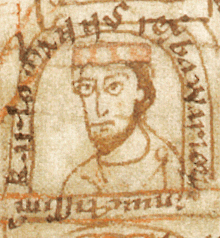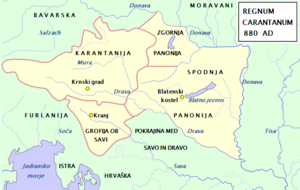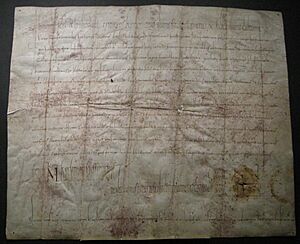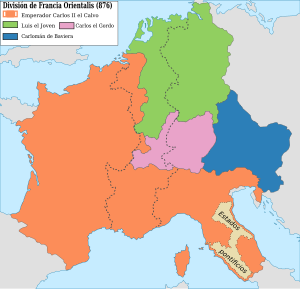Carloman of Bavaria facts for kids
Quick facts for kids Carloman |
|
|---|---|

Carloman (Karlomannus rex Bawariae), from a 12th-century manuscript
|
|
| King of Bavaria | |
| Reign | 28 August 876 – 879 |
| Predecessor | Louis II |
| Successor | Louis III |
| King of Italy | |
| Reign | 877–879 |
| Predecessor | Charles II |
| Successor | Charles III |
| Born | c. 830 |
| Died | 22 March 880 |
| Burial | Ötting, Bavaria |
| Issue | Arnulf |
| Dynasty | Carolingian |
| Father | Louis II |
| Mother | Hemma |
Carloman (born around 830 – died March 22, 880) was a Frankish king from the Carolingian dynasty. He was the oldest son of Louis the German, who was the king of East Francia. His mother was Hemma. Carloman became the governor of Carantania in 856. He also led the armies protecting the southeastern borders starting in 864. When his father died in 876, Carloman became the King of Bavaria. He also became King of Italy in 877. In 879, Carloman became very ill, possibly from a stroke. He then gave up his kingdoms to his younger brothers. Bavaria went to Louis the Younger, and Italy went to Charles the Fat.
Contents
Early Life of Carloman
Carloman was likely born around 828 or 830. His name was chosen to connect him to an earlier ruler named Carloman. This earlier Carloman had ruled a region called Alemannia.
Carloman was old enough to join a civil war between 840 and 843. This war was fought between his father and his uncles. Carloman first appeared in public in 842. He led an army from Bavaria to help his father. He then fought alongside his father and one uncle against another uncle. This was the start of his military career. People later described Carloman as very warlike.
In 848, Carloman was at a meeting with his father in Regensburg. There, a Slavic leader was rewarded for defending the Bavarian border. Carloman signed his name first among the important non-religious leaders. This showed his growing importance.
Carloman had a son named Arnulf around 850. Arnulf later became a very important ruler. Carloman's connection to Bavaria was strong from early on. Around 860, Arnulf and his cousin were at their grandfather's court. Their grandfather likely trained them for military roles.
Protecting the Southeastern Borders
In 856, Carloman's father, King Louis, gave him his first important job. He made Carloman the governor of Carantania. This was a region in the southeastern part of the kingdom. He was called the "prelate of the Carantanians." This first role was to help him gain experience. His father wanted to make sure Carloman didn't try to take too much power too soon.
Carloman began to take on a bigger role in protecting the border regions. From 857, he sometimes witnessed his father's official documents. In 858, he led a military trip against Great Moravia.
In 861, Carloman had problems with some border commanders. He removed them from their jobs and put his own loyal people in charge. He did this without his father's permission. By 862, an open conflict started between Carloman and his father. Carloman joined forces with Rastislav of Moravia. He took control of all the southeastern regions. He even moved into Bavaria, reaching the Inn river.
His father and he tried to make peace, but it failed. In 863, King Louis invaded Carloman's territory. He forced Carloman to give up and took him prisoner. Carloman was replaced by another count as governor. He stayed in his father's custody until 864. Then, he escaped and went back to Carantania. His supporters welcomed him, and he took power again.
King Louis was fighting against Moravia at the time. But he stopped and moved towards Carantania. They avoided another fight by making peace. Carloman submitted to his father. In return, he was given back his role as governor of the eastern borders.
In 870, Carloman helped the Franks take control over Great Moravia. He worked with Svatopluk. Svatopluk captured his uncle, Rastislav of Moravia, who was the ruling prince of Moravia. Svatopluk handed Rastislav over to Carloman. During a Frankish invasion, the Moravian archbishop Methodius was also captured and sent to Carloman.
In 871, Carloman captured Svatopluk. This gave him direct control over the whole region. But he soon decided to put Svatopluk back in charge to calm the country. This turned out to be a bad idea. As soon as Svatopluk returned to Moravia, he turned against Carloman. He caused heavy losses for the Frankish army.
In 873, after the Pope got involved, peace was made. This ended the war on the eastern borders.
The Frankfurt Agreement
To prevent future family fights, King Louis decided how his three sons would share power. In 865, they made an agreement in Frankfurt. This plan became known as the Division of Frankfurt.
Carloman was set to receive Bavaria and the southeastern border regions. His brother Louis the Younger would get Saxony and Franconia. Their youngest brother, Charles the Fat, would get Alemannia. The sons would only become rulers of these areas after their father died. None of them would be called king while their father was still alive. But their roles in the government were clearly set out. King Louis kept all the main powers of a king.
Around this time, all the king's sons married into important families from the regions they were set to rule. Carloman married the daughter of a Bavarian military leader named Ernest. This marriage happened before Ernest lost his position in 861.
By the 870s, Carloman's mother, Emma, was encouraging her husband to favor Carloman. This might have been because King Louis was ill around 869–870.
King of Italy
On August 12, 875, Louis II of Italy died. His kingdom was wanted by Carloman's father, Louis the German, for Carloman and his brother Charles. It was also wanted by Carloman's uncle, Charles the Bald. Pope John VIII, who was dealing with attacks from Muslim Sicily, sided with Charles the Bald.
Carloman led an army into Italy. He gave an official document to a monastery there. In this document, Carloman said he was Louis II's chosen successor. According to some records, Charles the Bald had to pay Carloman a lot of gold, silver, and jewels to make him leave Italy.
On August 28, 876, Carloman's father, Louis the German, died. His sons then became kings in their assigned kingdoms. On October 6, 877, Charles the Bald died. Later that month, Carloman was chosen as King of Italy by the nobles in Pavia. Taking over Italy was appealing because it offered rewards. These rewards could be shared with his followers. This helped cover the costs of raising an army and crossing the Alps mountains.
As King of Italy, Carloman confirmed that bishops would continue to be royal representatives in their areas. He also gave more power to individual bishops to gain their loyalty. He was one of the few Carolingian kings of Italy who didn't issue a special law at the start of his rule. Such laws usually declared their right to rule and promised good government.
In 879, Carloman gave land to a monastery in Italy. The Pope, who had failed to get help from Charles the Bald's heir, asked Carloman for help. But it was too late. Carloman was already too ill to rule. Before he gave up his throne, he gave some land to a church founded by Queen Engelberga.
Carloman had coins minted in Milan and Pavia, Italy. These coins had his name on them and a picture of a temple. He did not make coins in Bavaria.
King of Bavaria
In Bavaria, Carloman rebuilt a palace and monastery at Ötting. He dedicated it to the Virgin Mary and other saints. He appointed his father's friend, Baldo, as his chancellor. In 878, there might have been an attempt to kill him. A count named Ermenpert surrounded the king with soldiers. But the count later fled to West Francia.
Carloman prepared his son Arnulf to take over in Bavaria. In an official document, he called Arnulf a "regal son." This was a special term for a king's son. Some people supported this idea, but others did not. They appealed to Carloman's brother Louis.
In early 879, Carloman became very ill. He might have had a stroke. His brother Louis came to Bavaria to be recognized as the future king. By Easter, Louis had left. Arnulf took control of the kingdom in his father's name. He removed some important counts from their positions. These counts asked Louis to put them back in charge.
Carloman tried to make Arnulf's actions seem official. He added his son's name to the prayers in his documents. But in November, Louis came back to Bavaria to settle the issue of who would rule next. He put the removed counts back in their jobs. Carloman formally gave his Bavarian throne to his brother. He also placed Arnulf under Louis's protection. His brother Charles began his rule in Italy from November 879. This suggests Carloman gave up that kingdom at the same time.
Illness and Death
Records say that Carloman lost his voice when he became ill in 879. But he could still communicate by writing. One writer from that time, Regino of Prüm, said Carloman was "learned in letters." This means he could write Latin.
Regino of Prüm wrote many good things about Carloman: "That excellent king was learned, devoted to his Christian faith, fair, peaceful, and morally good. He was very handsome and incredibly strong. He had a very warlike spirit. He fought many wars against Slavic kingdoms with his father, and even more without him. He always won and expanded his empire with glory. He was kind to his own people and a terror to his enemies. He was charming when he spoke, humble, and very clever at managing the kingdom's business. He was so skilled that he truly showed what a king should be."
Most sources say Carloman died in March 880. He was buried in the chapel of his palace at Ötting. Carloman left one son, Arnulf. Arnulf continued to be an important leader during the reigns of Carloman's brothers. In 887, Arnulf became king of East Francia. In 896, he became emperor.
Sources
|
Carloman of Bavaria
Born: c. 830 Died: 22 March 880 |
||
| Regnal titles | ||
|---|---|---|
| Preceded by Louis the German as King of Eastern Francia |
King of Bavaria 876–880 |
Succeeded by Louis the Younger |
| Preceded by Charles the Bald |
King of Italy 877–880 |
Succeeded by Charles the Fat |
| Other offices | ||
| Preceded by Radbod as count |
Governor of Carantania and the Pannonian March 856–863 and 864–876 |
Succeeded by Aribo as count |
 | May Edward Chinn |
 | Rebecca Cole |
 | Alexa Canady |
 | Dorothy Lavinia Brown |




